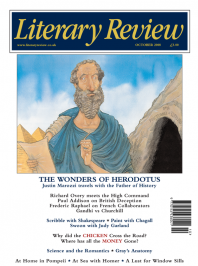John Keay
Who’s the Daddy?
The Man Who Invented History: Travels with Herodotus
By Justin Marozzi
John Murray 352pp £25
Once it was Horace who was the discerning traveller’s author of choice. Richard Burton supposedly took the Odes to Lake Tanganyika, and the naturalist Charles Waterton was never without them up the Orinoco (he even recited them in his hammock while waiting for vampire bats to alight on his proffered big toe). Horace soothed the spirit, passed the time; his syntax no less than his urbanity provided food for lofty thought. But tastes have changed. Nowadays the educated adventurer’s hand luggage is more likely to contain Herodotus. Ryszard Kapuscinski, the legendary Polish correspondent, was despatched on his first assignment with a copy of The Histories by way of an induction to news gathering. He carried it throughout an infallibly unnerving career and then celebrated it in the memoir Travels with Herodotus. First published in English in 2007, Kapuscinski’s book must have appeared just as Justin Marozzi was completing The Man Who Invented History, an account of his own travels with Herodotus.
Seemingly Herodotus is more of our times than Horace. He wrote in admirably accessible prose, loved a good story, punctuated it with endearing asides, and focused on war – specifically the Graeco-Persian conflict of the early fifth century BC that included the battles of Marathon, Thermopylae and Plataea. Great deeds,

Sign Up to our newsletter
Receive free articles, highlights from the archive, news, details of prizes, and much more.@Lit_Review
Follow Literary Review on Twitter
Twitter Feed
It wasn’t until 1825 that Pepys’s diary became available for the first time. How it was eventually decrypted and published is a story of subterfuge and duplicity.
Kate Loveman tells the tale.
Kate Loveman - Publishing Pepys
Kate Loveman: Publishing Pepys
literaryreview.co.uk
Arthur Christopher Benson was a pillar of the Edwardian establishment. He was supremely well connected. As his newly published diaries reveal, he was also riotously indiscreet.
Piers Brendon compares Benson’s journals to others from the 20th century.
Piers Brendon - Land of Dopes & Tories
Piers Brendon: Land of Dopes & Tories - The Benson Diaries: Selections from the Diary of Arthur Christopher Benson by Eamon Duffy & Ronald Hyam (edd)
literaryreview.co.uk
Of the siblings Gwen and Augustus John, it is Augustus who has commanded most attention from collectors and connoisseurs.
Was he really the finer artist, asks Tanya Harrod, or is it time Gwen emerged from her brother’s shadow?
Tanya Harrod - Cut from the Same Canvas
Tanya Harrod: Cut from the Same Canvas - Artists, Siblings, Visionaries: The Lives and Loves of Gwen and Augustus John by Judith Mackrell
literaryreview.co.uk